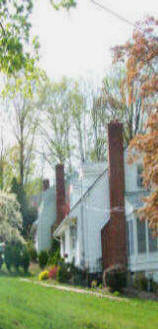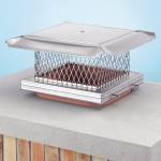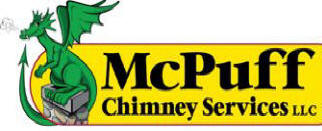Serving NJ Families Since 1977 ☼ Call Toll Free: 1 800 399 1492

The chimney for your oil or gas furnace also needs to be cleaned periodically to prevent creosote build up

A VARIETY OF CAPS ARE AVAILABLE TO PROTECT AGAINST RAIN, PESTS AND WIND DAMAGE
Your Questions
Why Does My Fireplace Smoke So Much?
A fireplace that is functioning properly shouldn't create smoke in your home. If you get smoke in the house each time you light a fire, you should contact a certified chimney specialist to inspect your system.
It is possible that you are trying to burn wood that still has a high moisture content. Wet wood smokes a lot when you try to burn it.
If your chimney isn't producing a good updraft of air, that could cause smoke to accumulate in the firebox and waft back into your living area.
If you find that the smoke accumulates when it is windy outside, that could mean that you need more roof clearance for your flue. Your roofline may be deflecting air into your chimney and forcing air back into your home.
Whatever the reason for the excess smoke, our McPuff professionals can diagnose and solve your problem. Call us anytime you are concerned about your chimney or other heat venting systems in your home or business.
Why Is The Chimney Odor So Strong?
The chief cause of chimney odor is "creosote." This is a black crust that accumulates inside a chimney over time.
The odor of creosote is particularly noticeable when chimneys are damp and when wind or poor construction blow air down the chimney and into the home.
If the odor in your fireplace is strong enough for you to notice it frequently, it is a good idea to have your chimney inspected by a certified chimney sweep. Creosote can catch fire and chimney fires are potentially dangerous.
Why Do I Smell Oil in My Chimney?
Some chimneys contain more than one flue. In some cases, the flue from an oil burning furnace will share a chimney with a fireplace.
If the heating system is properly designed and functioning correctly, there should be no oil smell. This is a case for an inspection by a certified chimney professional.
Why Is it so Hard to Light A Fire in My Fireplace?
You need two things for a good fire: air circulation and dry fuel. If you always have difficulty starting a fire in your fireplace, check first to make sure your wood and kindling are dry.
If moisture in the wood isn't your problem, it is very likely that your chimney isn't drawing air upward properly. This can mean that something is blocking the airflow or that the air pattern on the roof is pressuring the air downward rather than drawing it up.
First try lighting some newspaper to warm up the air inside the chimney. Since warm air rises, this is sometimes enough to start the upward airflow needed to draw oxygen into your fire.
If that doesn't work, it's time to call in a chimney specialist to examine your system. We have a number of tools that can solve a problem with the airflow in a chimney.
Why Are There Water Stains Inside My Fireplace?
Water stains in your fireplace probably mean that rain is getting down inside your flue and dripping down into the firebox. This means you need to have your chimney cap and damper inspected for rust or deterioration.
Sometimes, a chimney crown can be cracked or set at an improper angle so that rain and melting snow leak down into the house along the outside of a flue.

